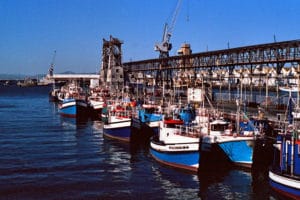Cornucopia’s Take: A recent report reveals that slave labor is used in the fishing industry, detaining workers on boats for months, or even years, at a time. Sustainability audits are not effective at protecting workers, so advocates offer a hotline, and a future app, so laborers can share their stories about this inhuman practice.
When fishermen are slaves, labor audits mean nothing
The FERN
by Kristina Johnson
 |
“We found men in cages and being beaten,” said AP reporter Robin McDowell over Skype at the Monterey Bay Aquarium’s Sustainable Food Institute in Monterey, Calif. McDowell, along with her colleagues, helped rescue more than 2,000 Southeast Asian men from slavery during a months-long investigation into labor abuses in the global fishing industry, especially in Indonesia and Hawaii.
According to the McDowell, 24 hour workdays, murders at sea, physical abuse and not docking for months or years at a time were common for the men they met. “A few… told the same story about a man named the Enforcer, an Indonesian villager who marched them up the hill and beat them until they fell to their knees and then put them in a hut and kept them there for a month,” she said.
McDowell and her colleagues spent the first part of their reporting targeting the small, Indonesian island of Benjina, 400 miles north Australia in the Arafura Sea. As Indonesian fleets have over-harvested waters closer to home, they’ve had to go farther out to sea for their catch, driving the demand for cheap labor. And nothing is cheaper than a slave.


 Follow Us
Follow Us Like Us
Like Us